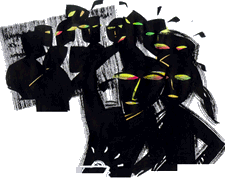Miscellanea/Manjula Padmanabhan
On a sunny day in winter, anything's possible. Even democracy.

"Photo Identity Card?" asked the Gurkha at the gate.
I nodded. "Go to the rear,"
he said, "there is a queue."
But it was a swarm of people I found, buzzing at the entrance
of what looked like a milk-booth. My heart sank. The line had curled
in on itself like a snail-shell, so to get to the end of it, one
went to the heart of the throng. How bruised and tender one feels
at the end of a queue! How open to ridicule, the last one, the
late one! But soon there were others between myself and the raw,
growing tip. In the friendly sunlight of the morning, eager
potential voters joined up, bright-faced. The ladies wore toxic-shock
colours. The men looked as if they'd had their first shave in
weeks.
Few, it seemed, had ever had their phootoo taken.
Fewer still were degree-holders, desk-jockeys, pen-fencers. I belonged
to a minority group so small that other tribe members gravitated
towards me automatically. Their expressions changed like traffic
lights as they understood the orgy of frustration that lay ahead.
Green for the first moments of innocence while they confirmed
that this was the correct queue. Amber while they believed that
social privilege would spare them having to wait alongside their
less advantaged fellow-citizens. Red for defeat at discovering
there was no other choice.
For the first hour there seemed to be no forward momentum. May
be a hundred people stood in the queue, while an equal member
sat on the lawns: Young mothers with babies, old people, sick
people, anyone for whom the physical strain of standing was too
much to bear. But what looked like a milk-booth was actually a
concrete shunt angled downwards into the bowels of the building
adjacent to the queue. Another fifty hopefuls were accommodated
within it. And beyond the photo-chamber, there was another room
in which sad-eyed functionaries fended off an army of people waving
small chits at them.
Two young sisters asked me for directions, then fell into a smiling
acquaintance across the span of the queue. The younger one, in
a powder-blue salwar suit was concerned for their
whitehaired mother, a heart patient who needed to take her pill.
"Is it really necessary, this card?" she wanted to know.
I said I'd heard it was to be the ration card of the future. Meanwhile,
another lady, returning from the interior, had news. "It's
a madhouse in there!" she said. "People are fighting!
No one's in control of the door!" She laughed at my dismay
when she suggested muscling my way in. "My advice is swallow
your principles, if you want your card!"
Blue Salwar asked me what I thought -- surely this kind of waiting
was an outrage? I said I didn't mind it if wasn't in vain. Her
smile was cynical. She said, "At times like this, people
with a conscience suffer! My sister's also like you." She
made it sound like a physical handicap.
In the third hour, I entered the concrete bunker. Meanwhile Blue
Salwar came back looking grim. "They're just making us wait
even more. Why must they insult us like this?" She was disillusioned
with queues, with India, with life. "If not for you,"
she said, smiling a little angrily, "I'd never have stayed!"
Just then, a staffer came up and ushered mother and daughter inside
for the shot.
By the fourth hour, I was within sight of the door. Infiltrators
were trying to squirm in. One youth claimed, "I've not eaten
since morning!" The wiry young man behind me laughed pitilessly.
"Some of us don't eat all day!" he said and tightened
security against invasion.
In the final half hour, events moved
fast. Within the room, two computer terminals processed four people
at a time. Behind a barricade of steel cupboard was the camera.
In the time that it took to sit down and slick back one's hair,
it was done.
Going out was like being on a victory parade. People whose faces
were now familiar, waved. I beamed back at them. "It's worth
it!" I told them. "It's okay once you're inside!"
I went home feeling enormously virtuous. In summer or monsoon,
in fever or before a deadline, it would have been a nightmare.
But on a sunny day in winter, anything's possible. Even democracy.
Illustration: Dominic Xavier
|





